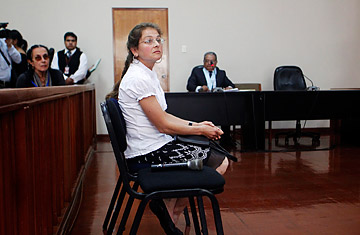
U.S. citizen Lori Berenson attends a hearing reviewing her parole at an antiterrorism court in Lima
Lori Berenson, the American woman convicted and sentenced on terrorism charges in Peru, can get on with rebuilding her life now that an appeals panel has confirmed her parole. The Jan. 21 decision by a three-judge panel ended a grueling process for Berenson, 40, which saw her freed in May after nearly 15 years in prison, sent back to prison in August on a technicality and released again in November. The latest decision is final, and Berenson, a New Yorker, tells TIME that it means she can start planning a life for herself and her 20-month-old son Salvador.
"I need to organize my life," she says. "My son needs to start preschool. I want to continue studying and get a professional background in translation. I need to attend to my health problems." She also has to get used to living in Peru, a country she has basically known only from behind prison walls. She arrived in Peru only a year before her arrest in November 1995 for collaborating with the Marxist Túpac Amaru Revolutionary Movement (MRTA).
A condition of Berenson's parole is that she finish serving her 20-year sentence in Peru, remaining in the country through November 2015. She needs to register with judicial authorities once a month, and the antiterrorism police will keep close tabs on her comings and goings. There are strict rules about where she can go and who she can meet.
That means living among neighbors who almost universally consider her a menace, a point stressed by antiterrorism prosecutor Julio Galindo after he presented arguments against her parole to the appeals panel on Jan. 10. "I do not believe that she is repentant," he told TIME. "Allowing the parole to stand would create a terrible precedent for Peru, where terrorism is still a threat."
Berenson became aware of the negative atmosphere after three recent incidents near her apartment in Lima's upscale Miraflores district. She stopped going to a nearby park after threats were made against her son. "A woman came up to me and said I should take care of Salvador because something could happen to him. We have not gone back to that park," says Berenson.
Part of the problem has been created by President Alan García's government, which began toying with the idea of commuting Berenson's sentence and expelling her from the country shortly after she was first paroled in May. The President is on record as saying that he does not consider Berenson a threat to national security, but taking the next step of expulsion is politically dicey even for García, who cannot run for a consecutive term in the upcoming April elections but will likely stand again five years from now.
"I don't know if things would be as bad if the government had not said I could be kicked out of the country," says Berenson. "By saying this and then not doing it has been like saying that a demon is living next door." She adds, "I can't imagine what it will be like living here the next five years, but I will do whatever it takes to remain out of sight."
The judges' decision in her case, however, is likely to rekindle the debate about the legacy of terrorism in Peru just as the country moves toward general elections on April 10. Former President Alejandro Toledo (2001-06), a front runner to retake his old office, is already under attack by opponents for signing off on legislation that allowed convicted terrorists to apply for parole. That legislation was repealed in October 2009, one month after Berenson successfully applied for early release.
Next up on the docket is a case involving Nancy Gilvonio, who was arrested with Berenson in 1995 and paroled in September. She is the widow of Nestor Cerpa, an MRTA leader who was killed in April 1997 in a raid that ended a four-month hostage siege he was leading at the Japanese ambassador's residence. Antiterrorism prosecutor Galindo has appealed her parole on the same grounds used in the Berenson case, so Gilvonio, too, is likely to remain free.
Trickier are the cases involving jailed members of the Shining Path, a much more ruthless, Maoist-inspired revolutionary group that kept Peru on edge through the 1980s and early 1990s. The Shining Path is blamed for more than half of the nearly 70,000 people killed in political violence in Peru between 1980 and 2000. While nearly extinct since the arrest of its leaders in 1992, two bands of remnants continue to operate jungle valleys that are also the principal zones where coca, the raw ingredient in cocaine, is grown. Shining Path fighters killed 19 police officers and soldiers in 2010, down from the previous year but still troubling.
Several top Shining Path leaders are awaiting decisions on their parole requests. A few have been turned down, but others have clearly met the same legal criteria applied in the Berenson case. Even if parole is denied, an important crop of Shining Path leaders will be released next year and in 2013, having completed their sentences.
